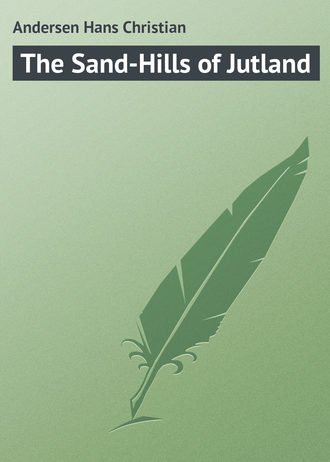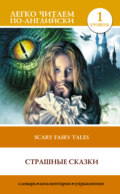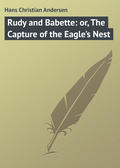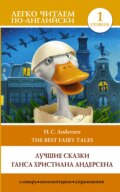
Ганс Христиан Андерсен
The Sand-Hills of Jutland
And Helga humbly bowed her head, looked at the ostriches rushing past, saw their surprise and their simple joy at the sight of their own large shadows on the white wall, and more serious thoughts took possession of her mind, adding to her present happiness – inspiring brighter hopes for the future. What was yet to happen? The best for her, "God willing."
In the early spring, when the storks were about to go north again, Helga took from her arm a golden bracelet, scratched her name upon it, beckoned to the stork-father, hung the gold band round his neck, and bade him carry it to the Viking's wife, who would thereby know that her adopted daughter lived, was happy, and remembered her.
"It is heavy to carry," thought the stork, when it was hung round his neck; "but gold and honour must not be flung away upon the high road. The stork brings luck – they must admit that up yonder."
"Thou layest gold, and I lay eggs," said the stork-mother; "but thou layest only once, and I lay every year. But neither of us gets any thanks, which is very vexatious."
"One knows, however, that one has done one's duty," said the stork-father.
"But that can't be hung up to be seen and lauded; and if it could be, fine words butter no parsnips."
So they flew away.
The little nightingale that sang upon the tamarind tree would also soon be going north, up yonder near "the wild morass." Helga had often heard it – she would send a message by it; for, since she had flown in the magical disguise of the swan, she had often spoken to the storks and the swallows. The nightingale would therefore understand her, and she prayed it to fly to the beech wood upon the Jutland peninsula, where the tomb of stone and branches had been erected. She asked it to beg all the little birds to protect the sacred spot, and frequently to sing over it.
And the nightingale flew away, and time flew also.
And the eagle stood upon a pyramid, and looked in the autumn on a stately procession with richly-laden camels, with armed and splendidly equipped men on snorting Arabian horses shining white like silver, with red trembling nostrils, with long thick manes hanging down to their slender legs. Rich guests – a royal Arabian prince, handsome as a prince should be – approached the gorgeous palace where the storks' nests stood empty. Those who dwelt in these nests were away in the far North, but they were soon to return; and they arrived on the very day that was most marked by joy and festivities. It was a wedding feast; and the beautiful Helga, clad in silk and jewels, was the bride. The bridegroom was the young prince from Arabia. They sat at the upper end of the table, between her mother and grandfather.
But she looked not at the bridegroom's bronzed and manly cheek, where the dark beard curled. She looked not at his black eyes, so full of fire, that were fastened upon her. She gazed outwards upon the bright twinkling stars that glittered in the heavens.
Then a loud rustling of strong wings was heard in the air. The storks had come back; and the old pair, fatigued as they were after their journey, and much in need of rest, flew immediately down to the rails of the verandah, for they knew what festival was going on. They had heard already at the frontiers that Helga had had them painted upon the wall, introducing them into her own history.
"It was a kind thought of hers," said the stork-father.
"It is very little," said the stork-mother. "She could hardly have done less."
And when Helga saw them she rose, and went out into the verandah to stroke their backs. The old couple bowed their necks, and the youngest little ones felt themselves much honoured by being so well received.
And Helga looked up towards the shining stars, that glittered more and more brilliantly; and between them and her she beheld in the air a transparent form. It floated nearer to her. It was the dead Christian priest, who had also come to her bridal solemnity – come from the kingdom of heaven.
"The glory and the beauty up yonder far exceed all that is known on earth," he said.
And Helga pleaded softly, earnestly, that but for one moment she might be allowed to ascend up thither, and to cast one single glance on those heavenly scenes.
Then he raised her amidst splendour and magnificence, and a stream of delicious music. It was not around her only that all seemed to be brightness and music, but the light seemed to stream in her soul, and the sweet tones to be echoed there. Words cannot describe what she felt.
"We must now return," he said; "thou wilt be missed."
"Only one more glance!" she entreated. "Only one short minute!"
"We must return to earth – the guests are all departing."
"But one more glance – the last!"
And Helga stood again in the verandah, but all the torches outside were extinguished; all the light in the bridal saloon was gone; the storks were gone; no guests were to be seen – no bridegroom. All had vanished in these three short minutes.
Then Helga felt anxious. She wandered through the vast empty halls – there slept foreign soldiers. She opened the side door which led to her own chambers, and, as she fancied she was entering them, she found herself in the garden: it had not stood there. Red streaks crossed the skies; it was the dawn of day.
Only three minutes in heaven, and a whole night on earth had passed away.
Then she perceived the storks. She called to them, spoke their language, and the old stork turned his head towards her, listened, and drew near.
"Thou dost speak our language," said he. "What wouldst thou? Whence comest thou, thou foreign maiden?"
"It is I – it is Helga! Dost thou not know me? Three minutes ago we were talking together in the verandah."
"That is a mistake," said the stork. "Thou must have dreamt this."
"No, no," she said, and reminded him of the Viking's castle, "the wild morass," the journey thence.
Then the old stork winked with his eyes.
"That is a very old story; I have heard it from my great, great-grandmother's time. Yes, truly there was once in Egypt a princess from the Danish land; but she disappeared on the evening of her wedding, many hundred years ago, and was never seen again. Thou canst read that thyself upon the monument in the garden, upon which are sculptured both swans and storks, and above it stands one like thyself in the white marble."
And so it was. Helga saw, comprehended it all, and sank on her knees.
The sun burst forth in all its morning splendour, and as, in former days, with its first rays fell the frog disguise, and the lovely form became visible; so now, in the baptism of light, arose a form of celestial beauty, purer than the air, as if in a veil of radiance to the Father above. The body sank into dust, and where she had stood lay a faded lotus flower!
"Well, this is a new finale to the story," said the stork-father, "which I by no means expected; but I am quite satisfied with it."
"I wonder what the young ones will say to it?" replied the stork-mother.
"Ah! that, indeed, is of the most consequence," said the stork-father.
The Quickest Runners
There was a large reward offered – indeed, there were two rewards offered, a larger and a lesser one – for the greatest speed, not in one race alone, but to such as had got on fastest throughout the year.
"I got the highest prize," said the hare. "One had a right to expect justice when one's own family and best friends were in the council; but that the snail should have got the second prize I consider as almost an insult to me."
"No," observed the wooden fence, which had been a witness to the distribution of the prizes; "you must take diligence and good will into consideration. That remark was made by several very estimable persons, and that was also my opinion. To be sure the snail took half a year to cross the threshold; but he broke his thigh-bone in the tremendous exertion which that was for him. He devoted himself entirely to this race; and, moreover, he ran with his house on his back. All these weighed in his favour, and so he obtained the second prize."
"I think my claims might also have been taken into consideration," said the swallow. "More speedy than I, in flight and motion, I believe no one has shown himself. And where have I not been? Far, far away!"
"And that is just your misfortune," said the wooden fence. "You gad about too much. You are always on the wing, ready to start out of the country when it begins to freeze. You have no love for your fatherland. You cannot claim any consideration in it."
"But if I were to sleep all the winter through on the moor," inquired the swallow – "sleep my whole time away – should I be thus entitled to be taken into consideration?"
"Obtain an affidavit from the old woman of the moor that you did sleep half the year in your fatherland, then your claims will be taken into consideration."
"I deserved the first prize instead of the second," said the snail. "I know very well that the hare only ran from cowardice, whenever he thought there was danger near. I, on the contrary, made the trial the business of my life, and I have become a cripple in consequence of my exertions. If any one had a right to the first prize it was I; but I make no fuss; I scorn to do so."
"I can declare upon my honour that each prize, at least as far as my voice in the matter went, was accorded with strict justice," said the old sign-post in the wood, who had been one of the arbitrators. "I always act with due reflection, and according to order. Seven times before have I had the honour to be engaged in the distribution of the prizes, but never until to-day have I had my own way carried out. My plan has always hitherto been thwarted – that was, to give the first prize to one of the first letters in the alphabet, and the second prize to one of the last letters. If you will be so good as to grant me your attention, I will explain it to you. The eighth letter in the alphabet from A is H– that stands for Hare, and therefore I awarded the greatest prize to the Hare; and the eighth letter from the end is S, therefore the Snail obtained the second prize. Next time the I will carry off the first prize, and R the second. A due attention to order and rotation should prevail in all rewards and appointments. Everything should go according to rule. Rule must precede merit."
"I should certainly have voted for myself, had I not been among the judges," said the mule. "People must take into account not only how quickly one goes, but what other circumstances are in question; as, for instance, how much one carries. But I would not this time have thought about that, neither about the hare's wisdom in his flight – his tact in springing suddenly to one side, to put his pursuers on the wrong scent, away from his place of concealment. No; there is one thing many people think much of, and which ought never to be disregarded. It is called the beautiful. I saw that in the hare's charming well-grown ears; it is quite a pleasure to see how long they are. I fancied that I beheld myself when I was little, and so I voted for him."
"Hush!" said the fly. "As for me, I will not speak; I will only say one word. I know right well that I have outrun more than one hare. The other day I broke the hind legs of one of the young ones. I was sitting on the locomotive before the train: I often do that. One sees so well there one's own speed. A young hare ran for a long time in front of the engine: he had no idea that I was there. At length he was just going to turn off the line, when the locomotive went over his hind legs and broke them, for I was sitting on it. The hare remained lying there, but I drove on. That was surely getting before him; but I do not care for the prize."
"It appears to me," thought the wild rose, but she did not say it – it is not her nature to express her ideas openly, though it might have been well had she done so – "it appears to me that the sunbeam should have had the first prize of honour, and the second also. It passes in a moment the immeasurable space from the sun down to us, and comes with such power that all nature is awakened by it. It has such beauty, that all we roses redden and become fragrant under it. The high presiding authorities do not seem to have noticed it at all. Were I the sunbeam, I would give each of them a sunstroke, that I would; but it would only make them crazy, and they will very likely be that without it. I shall say nothing," thought the wild rose. "There is peace in the wood; it is delightful to blossom, to shed refreshing perfume around, to live amidst the songs of birds and the rustling of trees; but the sun's rays will outlive us all."
"What is the first prize?" asked the earth-worm, who had overslept himself, and only now joined them.
"It gives free entrance to the kitchen garden," said the mule. "I proposed the prize, as a clear-sighted and judicious member of the meeting, with a view to the hare's advantage. I was resolved he should have it, and he is now provided for. The snail has permission to sit on the stone fence, and to enjoy the moss and the sunshine; and, moreover, he is appointed to be one of the chief judges of the next race. It is well to have one who is practically acquainted with the business in hand – on a committee, as human beings call it. I must say I expect great things from the future – we have made so good a beginning."
The Bell's Hollow
"Ding-dong! ding-dong!" sounded from the buried bell in Odensee river. What sort of a river is that? Every child in the town of Odensee knows it. It flows round the foot of the gardens, from the locks to the water-mill, away under the wooden bridges. In the river grow yellow water-lilies, brown feather-like reeds, and the soft velvet-like bulrushes, so high and so large. Old, split willow trees, bent and twisted, hang far over the water by the side of the monks' meadows and the bleaching greens; but a little above is garden after garden – the one very different from the other; some with beautiful flowers and arbours, clean and in prim array, like dolls' villages; some only filled with cabbages; while in others there are no attempts at a garden to be seen at all, only great elder trees stretching themselves out, and hanging over the running water, which here and there is deeper than an oar can fathom.
Opposite to the nunnery is the deepest part. It is called "The Bell's Hollow," and there dwells the merman. He sleeps by day when the sun shines through the water, but comes forth on the clear starry nights, and by moonlight. He is very old. Grandmothers have heard of him from their grandmothers. They said he lived a lonely life, and had scarcely any one to speak to except the large old church bell. Once upon a time it hung up in the steeple of the church; but now there is no trace either of the steeple or the church, which was then called Saint Albani.
"Ding-dong! ding-dong!" rang the bell while it stood in the steeple; and one evening when the sun was setting, and the bell was in full motion, it broke loose, and flew through the air, its shining metal glowing in the red sunbeams. "Ding-dong! ding-dong! now I am going to rest," sang the bell; and it flew out to Odensee river, where it was deepest, and therefore that spot is now called "The Bell's Hollow." But it found neither sleep nor rest there. Down at the merman's it still rings; so that at times it is heard above, through the water, and many people say that its tones foretell a death; but there is no truth in that, for it rings to amuse the merman, who is now no longer alone.
And what does the bell relate? It was so very old, it was there before our grandmothers' grandmothers were born, and yet it was a child compared with the merman, who is an old, quiet, strange-looking person, with eel-skin leggings, a scaly tunic adorned with yellow water-lilies, a wreath of sedges in his hair, and weeds in his beard. It must be confessed he was not very handsome to look at.
It would take a year and a day to repeat all that the bell said, for it told the same old stories over and over again very minutely, making them sometimes longer, sometimes shorter, according to its mood. It told of the olden days – the rigorous, dark times.
To the tower upon St. Albani Church, where the bell hung, ascended a monk. He was both young and handsome, but had an air of deep melancholy. He looked through an aperture out over the Odensee river. Its bed then was broad, and the monks' meadows were a lake. He gazed over them, and over the green mound called "The Nuns Hill," beyond which the cloister lay, where the light shone from a nun's cell. He had known her well, and he remembered the past, and his heart beat wildly at the recollection.
"Ding-dong! ding-dong!" This was one of the bell's stories: —
"There came up to the tower one day an idiot servant of the bishop; and when I, the bell, who am cast in hard and heavy metal, swung about and pealed, I could have broken his head, for he seated himself immediately under me, and began to play with two sticks, exactly as if it had been a stringed instrument, and he sang to it thus: 'Now I may venture to sing aloud what elsewhere I dare not whisper – sing of all that is kept hidden behind locks and bolts. Yonder it is cold and damp. The rats eat the living bodies. No one knows of it; no one hears of it – not even now, when the bell is pouring forth its loudest peal – ding-dong! ding-dong!'
"There was a king: he was called Knud. He humbled himself both before bishops and monks; but as he unjustly oppressed the people, and laid heavy taxes on them, they armed themselves with all sorts of weapons, and chased him away as if he had been a wild beast. He sought shelter in the church, and had the doors and windows closed. The furious multitude surrounded the sacred edifice, as I heard related; the crows and the ravens, and the jackdaws to boot, became scared by the noise and the tumult; they flew up into the tower, and out again; they looked on the multitude below, they looked also in at the church windows, and shrieked out what they saw.
"King Knud knelt before the altar and prayed; his brothers Erik and Benedict stood guarding him with their drawn swords; but the king's servitor, the false Blake, betrayed his lord. They knew outside where he could be reached. A stone was cast in through the window at him, and the king lay dead. There were shouts and cries among the angry crowd, and cries among the flocks of frightened birds; and I joined them too. I pealed forth, 'Ding-dong! ding-dong!'
"The church bell hangs high, sees far around, receives visits from birds, and understands their language. To it whispers the wind through the wickets and apertures, and through every little chink; and the wind knows everything. He hears it from the air, for it encompasses all living things; it even enters into the lungs of human beings – it hears every word and every sigh. The air knows all, the wind repeats all, and the bell understands their speech, and rings it forth to the whole world – 'Ding dong! ding dong!'
"But all this was too much for me to hear and to know. I had not strength enough to ring it all out. I became so wearied, so heavy, that the beam from which I hung broke, and I flew through the luminous air down to where the river is deepest, where the merman dwells alone in solitude; and here I am, year after year, relating to him what I have seen and what I have heard. 'Ding-dong! ding-dong!'"
Thus rang the chimes from "The Bell's Hollow" in the Odensee river, as my grandmother declares.
But our schoolmaster says there is no bell ringing down there, for it could not be; and there is no merman down there, for there are no mermen; and, when all the church bells are ringing loudly, he says that it is not the bells, but the air that makes the sound. My grandmother told me that the bell also said this; so, since the schoolmaster and the bell agree in this, no doubt it is true.
The air knows everything. It is round us, it is in us; it speaks of our thoughts and our actions; and it proclaims them farther than did the bell now down in the Hollow in Odensee river, where the merman dwells – it proclaims all out into the great vault of heaven, far, far away, even into eternity, up to where the glorious bells of paradise peal in tones unknown to mortal ears.






